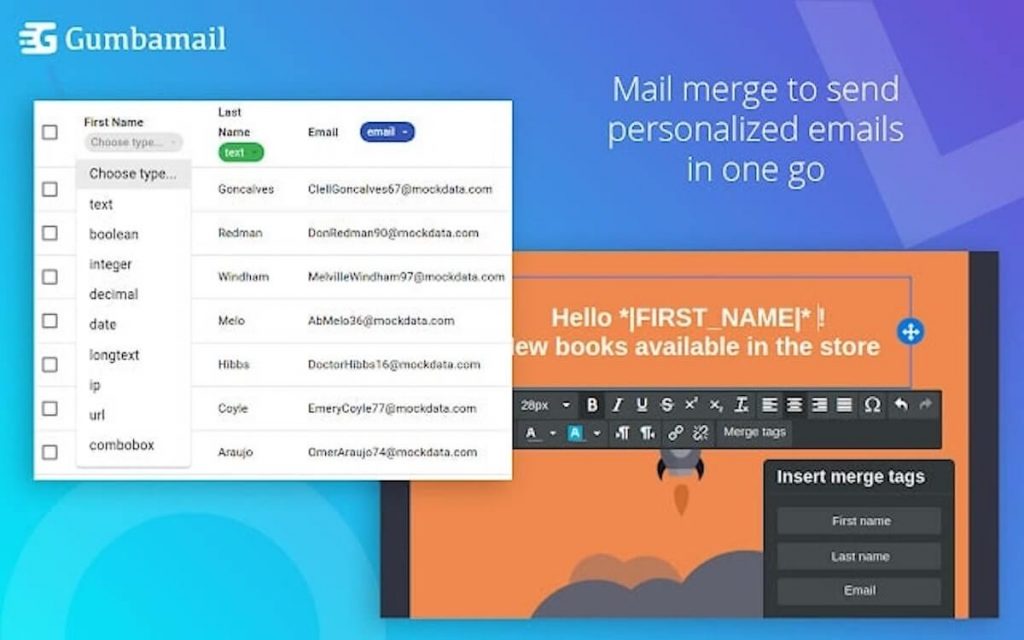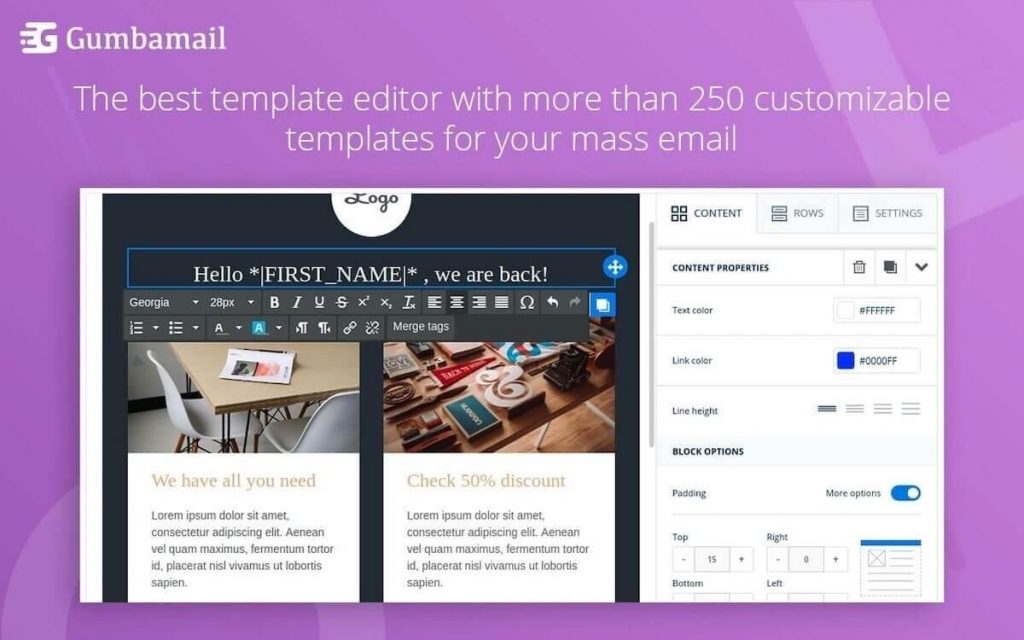Mailchimp vs. Constant Contact vs. Gumbamail: Which Is Best?
If you’re a small business owner looking to construct an email marketing strategy, Constant Contact and Mailchimp may be at the top of your list of potential platforms.
Why? For starters, the two are some of the most popular email service providers available. According to Datanyze, Mailchimp holds a 72.3% market share in the email marketing space, with a whopping 1.28 million websites using its platform. Constant Contact lags considerably behind in market share, capturing 4.72% of the sector. However, that adds up to an impressive 83,472 businesses using its platform.
That said, popularity does not always translate to a high-quality product. Below, we’ll investigate how Mailchimp vs. Constant Contact stacks up and whether there might be an “option C” — like Gumbamail — that’s better suited for your business.
Mailchimp vs. Constant Contact: An Overview of the Two Services
Both Constant Contact and Mailchimp are trusted providers within the email marketing space. We dive into an in-depth comparison below to help you decide which service is best for your business.
About Mailchimp
Launched in 2001, Mailchimp is a 100% founder-owned company that provides affordable email marketing automation to large and small businesses. While Mailchimp has name-recognizable clients, including Vimeo, TED, and New Belgium Brewing, its user-friendly interface and affordable pricing model are extremely attractive to small business owners.
Over the years, Mailchimp has expanded their services to social media posting, digital ads, a built-in CRM system, landing pages, snail-mail postcards, and even full websites.
About Constant Contact
While Constant Contact has considerably less market share, they’ve been around longer than Mailchimp. Launched in 1995, Constant Contact was originally designed with small business owners in mind. The company wanted to create an user-friendly email marketing software that allowed local mom-and-pop shops to compete with larger competition.
While Mailchimp offers more bells and whistles, Constant Contact employs a “quality-over-quantity” approach when developing their platform. The company boasts a 97% deliverability rate — one of the highest in the industry. In addition, the platform integrates with thousands of tools, comes complete with a simple user interface, and phone and email support for customer service, no matter the plan.
Mailchimp vs. Constant Contact: How Do the Two Platforms Measure Up?
If you’re pulling your hair out trying to decide between Mailchimp and Constant Contact, take a deep breath — we’re here to help. It’s often hard to distinguish the two services because they’re so similar. Below, we explore what the two platforms have in common and where to spot key differences to help make your decision.
Constant Contact and Mailchimp Similarities
Want to know where these two email marketing tools overlap? Both Mailchimp and Constant Contact supply the following features:
- Drag-and-drop editors: Both platforms are praised for their ease of use, allowing users to make gorgeous emails without a single line of code.
- List management: Both services offer a built-in CRM system, where users can store contact details, create custom fields, and segment their email list by tags.
- Reporting dashboard: Both platforms provide advanced reporting and analytics, where you can track open rates, click rates, and email deliverability rates, all in real-time. You can also track bounces, unsubscribes, and other metrics.
- Automation features: Both email marketing services allow you to create autoresponder email marketing campaigns (versus just single transactional emails). For example, you can create automation workflows such as welcome emails, birthday emails, product recommendations, and e-commerce workflows (such as abandoned cart emails).
- Integrations: Both email marketing solutions integrate with thousands of other platforms, including Google Analytics, CRM systems (like Salesforce), surveys (like SurveyMonkey), event platforms (like Eventbrite), online stores (like Shopify or WooCommerce), and website builders (like WordPress). Integrations are available through a native API integration and Zapier.
Constant Contact and Mailchimp Key Differentiators
Wondering how Constant Contact’s email solution is different from Mailchimp? Keep reading for a few important differences between the two platforms:
- A/B testing: While both email marketing platforms allow for A/B tests, Constant Contact only allows a subject line test. With Mailchimp, you can test three variations of your campaign, tweaking the body copy, subject line, or from field.
- Customer support: While both companies supply customer support, you will get a little more help with Constant Contact, which provides online and phone support with any plan. With Mailchimp, you only get chat support with their paid plans (not their free plan).
- Pricing: Mailchimp pricing is a slightly better deal than Constant Contact. Mailchimp includes a free plan for up to 2,000 subscribers, then paid-for plans running up to their premium plan costing $299 a month. Constant Contact’s pricing plans only offer a 30-day free trial. Their plans run between $9.99-$45 per month.
- Marketing features: Both platforms come complete with advanced features to meet your business needs. Constant Contact includes social media ads, signup forms, surveys, and event RSVPs. However, with Mailchimp’s platform, you get additional functionality, including customer journeys, a creative assistant, subject line helper, predicted demographics, postcard layouts, customizable landing pages, and other tools.
Introducing Option C: Could There Be a Better Solution for Your Business?

Both Constant Contact and Mailchimp are trusted solutions within the email marketing space. While you’re conducting your search, we’d like to introduce an option C: Gumbamail.
Gumbamail is an easy-to-use email marketing app that works in conjunction with your existing Gmail account. Gumbamail uses its own email servers, allowing it to bypass Google‘s sending limits and send unlimited emails per day. With Gumbamail, installation takes only minutes, and you can immediately start building your contact list.
You get many of the same features offered by Mailchimp and Constant Contact, including:
- Advanced segmentation: With Gumbamail, you can import contacts through a CSV file, Google Sheet, or by using your existing Google contacts. From there, you can create custom merge fields to help segment your list.
- Drag-and-drop editor: Gumbamail provides a zero-code email builder to start sending campaigns. Plus, it offers a library of 800+ email templates — more than Constant Contact and Mailchimp combined!
- Affordability: Gumbamail includes a forever-free plan, which fits perfectly into your small business budget. Plus, unlike Mailchimp, Gumbamail’s solution stays free no matter how large your contact list is.
- Advanced reporting: Gumbamail comes with a built-in reporting dashboard where you can track clicks, opens, unsubscribes, and other engagement metrics.
- Customer support: With Gumbamail, you get a complete knowledge base plus online support, with help in both English and Spanish.
Download Gumbamail to Develop Your Email Marketing Strategy

Constant Contact and Mailchimp are two popular email marketing platforms trusted by small business owners, nonprofits, and solopreneurs alike. Both solutions have similar functionality, including automation workflows, signup forms, list management, and a drag-and-drop email builder.
But if you’re looking for a user-friendly solution built exclusively for small business owners, consider Gumbamail. Because Gumbamail works with your existing Gmail account, it’s perfect for marketing beginners. Gumbamail comes complete with hundreds of templates, an easy-to-use email builder, advanced reporting metrics, and online tutorials and customer support to get you off the ground. Plus, Gumbamail comes at a lower price point than Mailchimp and Constant Contact.
Ready to see how Gumbamail can transform your marketing strategy? Download the free plugin to get started.


